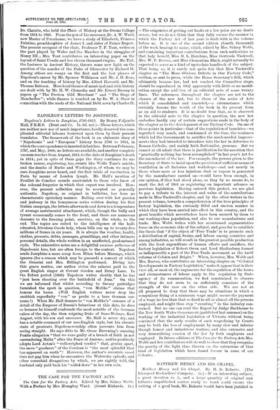THE CASE FOR THE FACTORY ACTS.
The Case for the Factory Acts. Edited by Mrs. Sidney Webb. With a Preface by Mrs. Humphry Ward. (Grant Richards. ls.) —The exigencies of getting out books at a low price are no doubt severe, but we do not think that they fully excuse the manner in which the Factory Act of last year is dealt with in the volume before us. It is one of the second edition (fourth thousand) of the work bearing its name, which, edited by Mrs. Sidney Webb, and containing important contributions from such authorities as that lady herself, Miss B. L. Hutchins, Miss Gertrude Tuckwell, Mrs. W. P. Reeves, and Miss Clementina Black, might naturally be expected to serve as a kind of up-to-date handbook of tho subject. That being so, it is surely not quite fair that Miss Tuckwell's chapter on " The More Obvious Defects in Our Factory Code," written, or sent to press, while the Home Secretary's Bill, which ultimately became law, had not reached the Committee stage, should be reproduced in 1902 apparently with little or no modifi- cation except the addition of an editorial note of seine twenty lines. The references throughout the chapter are not to the clauses of the new Act, but to those of the series of Acts which it consolidated and amended,—a circumstance which certainly lessens the worth of the book in its present form as an aid to students. It is no doubt true that, as is observed in the editorial note to the chapter in question, the now law embodies hardly any of certain suggestions made in the body of the chapter as to the development of our Factory Code. On one of those points in particular—that of the regulation of laundries—we regretted very much, and condemned at the time, the weakness which led the Government to sacrifice the much-needed improve- ments they had intended to introduce into the law in deference to Roman Catholic, and mainly Irish Nationalist, pressure. But we cannot at all admit that there is justification for the assertion that "practically nothing has been accomplished" in last year's Act for the amendment of the law. For example, the powers given to the Secretary of State to insist upon the provision of sufficient moans of ventilation in all factories and workshops—and not merely in those where more or less injurious dust or vapour is generated by the manufacture carried on—would have been enough, in our opinion, if they had stood alone, as they by no means do, to mark the Act of 1901 as registering an important advance on previous legislation. Having entered this protest, we are glad to pay a tribute to the interest and value of the contributions made in Miss Tuckwell's chapter, and by the other writers in the present volume, towards a comprehension of the true principles of factory legislation, the curiously fitful and uneven manner in which they have been carried into effect in this country, and the great benefits which nevertheless have been secured by them to our working-class population, and also to our manufactures and trade. Mrs. Webb writes with her accustomed argumentative force on the economic side of the subject, and goes far to establish the thesis that "if the object of 'Free Trade' is to promote such a distribution of capital, brains, and labour among countries and among industries, as will result in the greatest possible production with the least expenditure of human efforts and sacrifices, the factory legislation of Robert Owen and Lord Shaftesbury formed as indispensable a part of the Free Trade movement as the tariff reforms of Cobden and Bright." When, however, Mrs. Webb and Mrs. Reeves, who contributes an interesting chapter on "Colonial Developments in Factory Legislation," make it appear that in their view all, or most of, the arguments for the regulation of the hours and circumstances of labour apply to the regulation by State agency of its remuneration, we feel constrained to observe that they do not seem to us sufficiently conscious of the strength of the case on the other side. We are not at all prepared to deny that there may be situations in which a compulsory fixing of a minimum wage might secure the payment of a wage no less than that so fixed to all or almost all the persons employed, and might thus stop "sweating" in the industry con- cerned. But no one can read tho Report by Judge Backhouse to the New South Wales Government (published last summer) on the working of the industrial legislation of Victoria without being convinced that the early results of such wage-fixing by Courts may be both the loss of employment by many slow and inferior though honest and industrious workers, and also extensive and very demoralising evasion of the law by both employers and employed. In future editions of The Case for the Factory Acts Mrs. Webb and her contributors will do well to show that they recognise the gravity of the light thus thrown on the extensions of that kind of legislation which have found favour in sonic of our Colonies.


















































 Previous page
Previous page